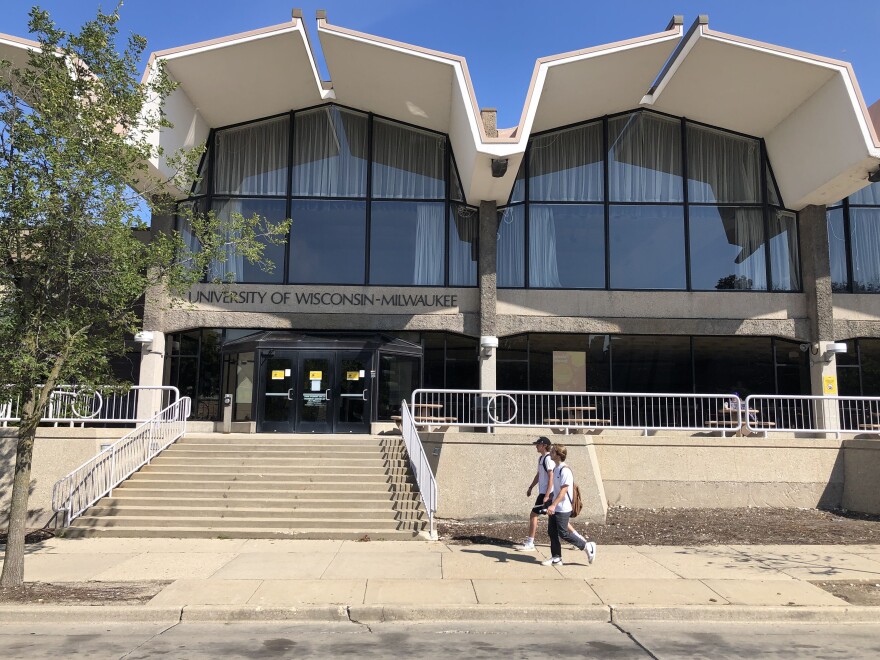More Wisconsin colleges and universities are promising free tuition to students with limited means.
UW-Madison already offers Bucky’s Tuition Promise. Now, the UW System is expanding it to its 12 other campuses, promising free tuition to students with family incomes under $62,000.
Some private schools are following suit. Carthage College in Kenosha announced what it calls the “Carthage Commitment” last week.
Carthage was already providing enough financial aid to low-income students so that they wouldn’t have up-front tuition costs, according to Interim Vice President for Admissions Ashley Hanson. She says, the new “Carthage Commitment” makes it public: families earning under $65,000 won’t have to worry about a tuition bill. Carthage’s sticker price is $34,500.
"Many students bypass private schools simply because of that advertised sticker price," Hanson says. "This helps us get the message out that higher education, specifically a private school, is affordable."

Like programs that already exist at UW-Madison, MATC and Lakeland University, Carthage is using a last-dollar model. That means federal Pell grants and state aid are applied to the tuition cost first, and then Carthage covers the rest. Carthage does differ from other schools in that it will also prompt students to use federal loans.
"Our promise is that after any federal, state aid, and the subsidized loan, the student’s direct, out-of-pocket cost to attend Carthage would be zero," says Hanson.
Hanson hopes the “Carthage Commitment” will motivate more Kenosha and Racine-area students with limited means to enroll.
Kevin Curley hopes it will also draw students from Milwaukee. Curley is senior program director at College Possible, which helps low-income students at 19 Milwaukee high schools apply to and stay in college.
"What’s also great about Carthage in particular is they make a four-year graduation promise to their students," says Curley. "And that really helps keep costs lower there."
The UW System’s new Wisconsin Tuition Promise, also starting next fall, will have an even bigger impact on Milwaukee high schoolers.
"What I’m particularly excited for is UW-Milwaukee being covered," says Curley. "Because that’s the largest school where our students attend. And tuition there is over $8,000 for students, so this will certainly help students in our local community and help them afford college and take on less student debt."
UWM Associate Vice Chancellor for Enrollment Management Kay Eilers says UWM students have some of highest unmet financial need in the state. UWM enrolls more low-income students than UW-Madison, but it has less institutional aid to give them.
"Getting funding to the students that need it most really will have a positive impact overall on outcomes," says Eilers. "So we’re very excited that there’s going to be more folks that have the ability to afford college and make it all the way through to graduation."
The new Wisconsin Tuition Promise is for resident students with family incomes under $62,000. The program was announced by new System President Jay Rothman in August and approved by the Board of Regents.
There are still some big questions about it. The first is funding. The UW System is using one-time funding to pay $14 million for the first year of the program. Leaders are asking the Republican-led Legislature to fund it in years to come – but there is no guarantee that will happen.
In response to a question about the financial sustainability of the Wisconsin Tuition Promise, UW System spokesperson Mark Pitsch wrote: "The UW is committed to the Wisconsin Tuition Promise for its universities. It unlocks educational opportunities for everyone in Wisconsin. We see ourselves as partners with the state to increase educational attainment and are hopeful and believe they can be supportive."
Another question is about a work requirement included in the Wisconsin Tuition Promise, which states students must have been employed at some point during the preceding year.
That requirement isn't included in the Bucky's Tuition Promise, which is the model for the program. UWM’s Kay Eilers says she’s waiting for information on how the work requirement will be implemented.
"That’s one of those that I’m still eager to understand the details, so I’ll have to defer to System on that one," Eilers says.
UW System's Pitsch said: "The work requirement demonstrates our commitment to address workforce needs and develop talent right away. Students will certify employment status."
Eilers says, in the meantime, she’s emphasizing that students need to complete the federal financial aid application known as the FAFSA, which opens Oct. 1. Students who fill out the FAFSA and apply to UW schools or Carthage College will be notified if they are eligible for free tuition.
Editor's note: WUWM is a service of UW-Milwaukee
Have a question about education you'd like WUWM's Emily Files to dig into? Submit it below.
_






